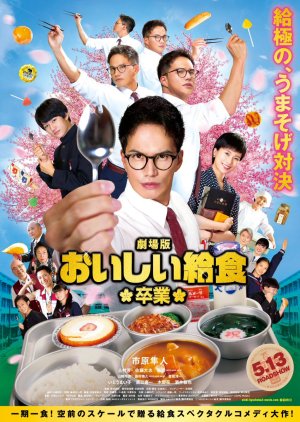A middle school teacher who loves school lunches competes with his student on who can make their school meals taste even better. A unique food comedy highlighting the importance of eating lunch together. (Source: jff.jpf.go.jp) Edit Translation
- English
- Español
- Português (Brasil)
- 한국어
- Native Title: 劇場版 おいしい給食 卒業
- Also Known As: Gekijo Ban: Oishi Kyushoku Sotsugyo
- Director: Ayabe Shinya
- Screenwriter: Nagamori Yuji
- Genres: Food, Comedy, Drama
Where to Watch School Meals Time Graduation
Subscription
Subscription
Cast & Credits
- Ichihara HayatoAmarida YukioMain Role
- Tsuchimura KahoMunekata SanaeSupport Role
- Sato TaishiKamino GouSupport Role
- Tosaka JunichiShikata TakeshiSupport Role
- Tamura YukihisaSanada KosukeSupport Role
- Yuhi Support Role
Reviews

The story of a man and his school meals.
This is the saying "good food, good mood" in cinematic form. I've always thought there's a correlation between the enjoyment of food and the environment we choose to consume it in, and I liked seeing that as a movie.The story revolves around junior high teacher Amarida Yukio and his love for school lunches. We watch him navigate his enjoyment of school lunches, his relationship with the others in the school and the feeling of enjoying food in general. He also has a rival in the form of his student, Kaminou Gou, to see who can come up with the more creative way to eat lunch with the dishes they are presented with.
I laughed, I cringed, I was moved by something I had no backstory about, even though they did (two seasons and a movie prior), and somewhere between the childish rivalry to see who can enjoy food more and the pure instict to just enjoy good food, I saw the development of a wonderful mentor/mentee relationship.
Eat well, in your favourite environment and then give this movie a try :)
Was this review helpful to you?

This review may contain spoilers
Very funny script, excellent comedic acting with impeccable timing and a serious message.
School meals are not just school meals.Eating is more than consuming nutrients.
Giving children food that will be good for them tomorrow, might not be the right thing for them today.
I love how teacher Amarida is so over-enthusiastic about his life passion -- and how nobody in the school bats an eye at his antics.
Ichihara Hayato's teacher is almost childlike in his joy about school meals. He dances in his seat in anticipation; his face, no, his *body* shows every emotion he feels while he's eating. Some call Ichihara's acting style pejoratively "over-acting" -- and if you do too, then you probably won't like this film much.
Like all of the great Japanese comedies, the film has an underlying message or two.
For the message Ichihara Hayato sees: "He loves what he loves and celebrates life no matter how much he's laughed at." (https://youtu.be/aOJa8KjDSA4?)
Maybe this film speaks to me more than to other people because I have been working in education in some way or other for the last 20 years, and I hear things that other people wouldn't. I hear a lot about what education should be.
If we take the "school meal" as the metaphor for the education we give to our children -- it's easy to see the parallels, right? -- they say "food for thought" in English and in German they say "das muss ich erst verdauen", if I get a hard/heavy piece of information, I'll have to digest it first.
We give the children "meals" that we think will be beneficial for them later -- which ingredients we choose, how we prepare them and how we present the meal, we should not only think of tomorrow's benefits but also if the children will even eat the meals joyfully. Why are the children who enter schools eager to learn at six years old -- why are most of those children apathetic to learning some years later? It's because we give children school "meals" that might be nutritious but don't give children joy when they consume them.
There was also a very poignant scene where a student tries to voice his opinion on the school meals in front of a whole room of powerful adults -- and not only do they not listen to him, they also laugh at him. The adult who are responsible for the children's well-being are not interested if the children are really happy. So, there's also this layer of meaning I can find in this comedy.
In conclusion, "School Meals Time Graduation" is what Japanese comedy can be when it's at its best -- very funny script, excellent comedic acting (if you like this style) with impeccable timing and a serious message.
Was this review helpful to you?
Recommendations
There have been no recommendations submitted. Be the first and add one.

























![[Japanese] Full-length Films ☀️](https://i.mydramalist.com/414D6t.jpg)
![[Japanese] Full-length Films ☀️](https://i.mydramalist.com/0bw57t.jpg)
![[Japanese] Full-length Films ☀️](https://i.mydramalist.com/9pAXnt.jpg)
![[Japanese] Full-length Films ☀️](https://i.mydramalist.com/2o3jWt.jpg)
![[Japanese] Full-length Films ☀️](https://i.mydramalist.com/Bdlk6t.jpg)





















